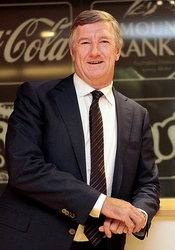
The talk is that Terry Davis, 54, who has been in the top job for more than 11 years - and is one of the country's longest serving chief executives - is close to calling time.
His most likely successor is tipped to be Warwick White, the head of the Australasian business, who has spent more than 28 years in the global Coca-Cola system.
Every November, Davis meets chairman David Gonski to discuss renewing his contract for another 12 months. A spokeswoman said on Tuesday: ''They did that in 2012 and Terry will be group managing director at least until the end of 2013. However, he has said that after 11 years … he is nearer the end of his career here than at the beginning.''
Advertisement
Other contenders are believed to include John Murphy, a former CEO of beer giant CUB, who joined Coca-Cola Amatil to help it develop its alcohol strategy. In July, he was appointed managing director of Australian beverages.
Davis has done a great job at CCA, including changing the culture to create a more innovative and performance-oriented approach, rather than a previous culture of promoting volume growth. To this end, he introduced new financial systems, overhauled management and lifted profit margins from 15.6 per cent to more than 20 per cent. In eight out of 11 years he has delivered double-digit profit growth.
In the process he has built an empire with strong earnings-per-share and dividend-per-share growth, which has translated into total shareholder returns of 373 per cent, outperforming the market by 2½ times.
But the latest financial results show times will get more challenging as the Australian business matures. Its carbonated soft drink business grew 0.4 points by volume in the past year and its main growth platform, Indonesia, is still relatively small and holds a few risks.
Against this backdrop, CCA will have to contend with the rising power of the supermarkets, the high Australian dollar and its troubled SPC Ardmona business, which it bought in 2005 for $750 million, including debt, and which has cost it $250 million in write-downs after tax.
In its latest full-year results for the year to December 2012, CCA reported a 22 per cent fall in net profit to $460 million after a $98.5 million write-down in its SPC Ardmona business. While Davis blamed the write-downs on the weather, the high dollar and various other external factors, the business has been a disappointment from the beginning.
Putting the write-downs aside, CCA's profit for 2012 was up 5 per cent, but that was off a low base in 2011 when it suffered from a cool summer and a dispute with Woolworths that cost it millions of dollars in sales.
But the big challenge will be managing its relationship with CCA's major shareholder, The Coca-Cola Company (TCCC), which holds 30 per cent of the shares.
Despite the various protestations over the years that CCA is not a puppet of TCCC, it is still part of the Coca-Cola system and that means abiding by its rules. To put it into perspective, in non-alcoholic beverages CCA brands (Kirks, Mount Franklin and Deep Spring) deliver about 10 per cent of volume in Australia.
In CCA's growth market, Indonesia, the perception is that TCCC's objective is to maximise volume, while CCA is more focused on profit margins. This has prompted speculation that TCCC has a strong desire to acquire the Indonesian assets from CCA or find a more aligned partner.
Speculation intensified in December when TCCC sold 51 per cent of its Philippines bottler to Mexican bottler Coca-Cola FEMSA, which marks its first expansion beyond Latin America.
Interestingly, CCA sold the Philippines business back to TCCC and San Miguel in early 2001 after it suffered deteriorating earnings.
Under Davis, CCA has done an outstanding job with Indonesia, generating earnings before interest and tax of $102 million for 2012, up 16.8 per cent (including Papua New Guinea), and growing volume more than 10 per cent, but there is a threat that down the track FEMSA might end up with it.
Indonesia is a key growth strategy for CCA and, as this column has written before, CCA would fight tooth and nail to keep its deal with TCCC, which will have the bigger say.
The big question is whether Davis stays on to see his beer strategy rekindled when a non-compete clause expires in December, or leaves it for his successor. He has a $50 million joint venture brewery in place and has made it clear that premium beer will be a key focus.





